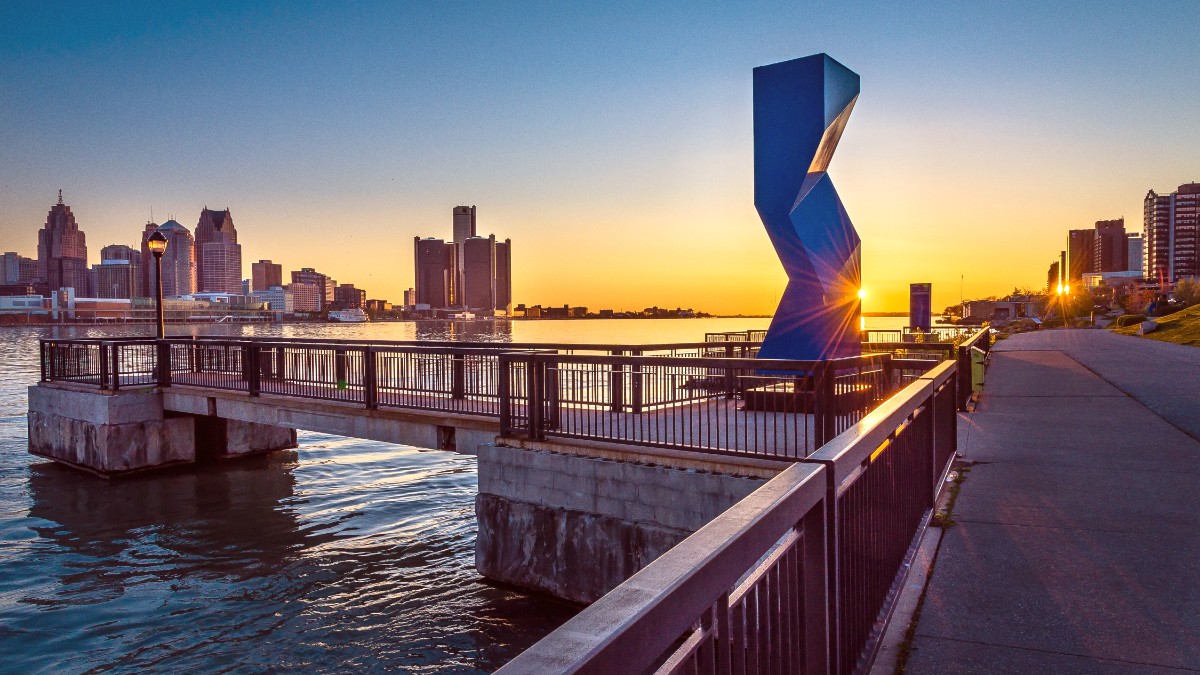
Great Lakes, USA
Spring (April-May): Temperatures are mild, typically ranging from the 40s to 60s Fahrenheit (4-18°C). Rainfall increases, and the city's parks and trees begin to bloom. It presents pleasant weather for walking.
Summer (June-August): This is the warmest period, with temperatures often in the 70s and 80s Fahrenheit (21-30°C). Humidity can be high. Occasional thunderstorms occur. Summer brings the most outdoor events.
Autumn (September-October): Temperatures are mild and comfortable, usually in the 50s and 60s Fahrenheit (10-18°C). Humidity drops. Fall foliage offers beautiful colors. Many consider this an ideal time to visit due to the pleasant weather and fewer crowds.
Winter (November-March): Cold temperatures define winter, averaging in the 20s and 30s Fahrenheit (-6-0°C). Significant snowfall is common, and icy conditions can occur. The city embraces winter with holiday events and nearby cold-weather activities.
For outdoor exploration (parks, Riverwalk), late Spring, Summer, or Early Autumn present the best conditions. Summer marks the peak for outdoor festivals like the Movement Electronic Music Festival and the Detroit Jazz Festival.
Museums and indoor attractions are enjoyable year-round, a good choice for winter visits. Sporting events align with their seasons: MLB (April-Sept), NFL (Sept-Jan), NBA & NHL (Oct-April).
June-August
Warm temperatures, numerous outdoor activities, baseball games, music festivals.
Higher prices for flights and accommodations, larger crowds at popular attractions, humidity.
April-May & Sept-Oct
Comfortable weather, fewer tourists, better prices than summer. Autumn foliage is beautiful. Spring brings fresh blooms.
Variable weather may necessitate layers. Some outdoor attractions might have reduced hours in late fall or early spring.
November-March
Lowest prices for flights and accommodations, fewer tourists, opportunities for winter sports nearby, festive atmosphere during holidays.
Cold weather, snow and ice can affect travel, some attractions may close or have limited hours.
Brief but heavy thunderstorms can occur in summer. Keep an eye on weather forecasts for these.
Heavy snowfall and blizzards are possible in winter. These conditions cause travel delays and hazardous driving. Road crews clear streets, but allow extra time.
September or October for good weather and fewer crowds.
Autumn presents beautiful colors, a pleasant bonus.
Summer months are best for festivals and outdoor activities.
Museums and indoor attractions are good year-round options.
Entry requirements for the United States vary based on your nationality. Most non-U.S. Citizens need either a visa or an approved Electronic System for Travel Authorization (ESTA).
Citizens of 40 countries can travel to the U.S. For tourism or business. Stays must be 90 days or less. An approved ESTA is a requirement.
If you do not meet the criteria for the VWP, a B-2 tourist visa is necessary. This process takes more time and planning.
Travel insurance offers protection against unforeseen circumstances, especially given U.S. Healthcare costs.
Prices vary widely based on your travel style and choices in Detroit.
The official currency is the United States Dollar (USD, $). Major credit cards (Visa, MasterCard, American Express, Discover) find wide acceptance everywhere.
ATMs are easy to find for cash withdrawals at banks, convenience stores, and airports. Notify your bank and credit card companies of your travel plans. This helps prevent card holds due to suspicious activity.
Approximate daily average: $70 - $120 USD. Focus on hostels, street food, and public transport.
Hostel dorm or budget motel ($30-$60)
Street food, fast casual, groceries ($20-$40)
Approximate daily average: $150 - $300 USD. Mid-range hotels, casual dining, ride-sharing.
Mid-range hotel or Airbnb ($100-$180)
Casual restaurants, some nicer dinners ($50-$100)
Approximate daily average: $350+ USD. Luxury hotels, fine dining, private transport.
Luxury hotel suite ($250+)
Fine dining, high-end restaurants ($100-$200+)
| Category | Item | Price Range (USD) |
|---|---|---|
| Accommodation | Hostel bed / Luxury Hotel | $30-$50 / $200-$500+ |
| Meals | Breakfast / Dinner (mid-range) | $5-$15 / $20-$60+ |
| Transportation | Bus/People Mover / Taxi (short) | $0.75-$2.00 / $10-$20 |
Travelers should consider health and safety for a smooth visit to Detroit.
No specific vaccinations are a requirement for U.S. Entry. Routine vaccinations should be current (MMR, DTaP, Polio, Varicella, Flu). Consult your healthcare provider.
Seasonal allergies (bring medication), sunburn (Sunscreen like Neutrogena Ultra Sheer SPF 70), insect bites (Insect repellent), dehydration (drink water). Tap water is safe.
Dial 911 for emergencies. Major medical centers include Henry Ford Hospital, DMC, Ascension St. John Hospital. Pharmacies like CVS and Walgreens are widely available.
Detroit has made significant progress in crime reduction. Tourist areas are generally safe.
Safer Areas: Downtown, Midtown, Corktown, New Center, Indian Village, Woodbridge. These areas experience revitalization and have lower crime rates. They contain many attractions and see regular patrols.
Areas to Exercise Caution: Some residential areas, specifically on the far east and west sides, may still present higher crime rates. Visitors should remain aware of their surroundings, particularly at night or in unfamiliar, poorly lit areas.
Always trust your instincts. If an area feels uncomfortable, relocate.
Avoid walking alone late at night in unfamiliar areas. Keep valuables out of sight. Be aware of your surroundings in crowded places. Do not leave items visible in your car.
Severe thunderstorms (spring/summer) sometimes bring tornadoes. Monitor local weather forecasts. Winter storms cause hazardous driving. Localized street flooding is possible with heavy rain.
Emergency Services (Police, Fire, Ambulance): 911. Non-Emergency Police (Detroit Police Department): (313) 596-2200. Check travel.state.gov for U.S. Travel alerts. Keep personal emergency contacts accessible.
If your passport or visa becomes lost or stolen, report it to your country's embassy or consulate immediately. File a police report for any stolen items.
Travel insurance offers protection for unexpected events. For adventurous travelers, World Nomads is a trusted choice. For digital nomads, SafetyWing provides comprehensive coverage.
Covers hospital stays, doctor visits, and emergency medical transportation.
Compensates for trip cancellation, interruption, or delays.
Protects against lost, stolen, or damaged luggage and personal items.